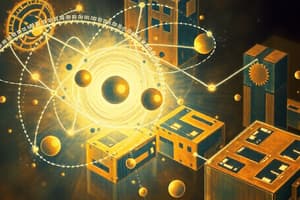Podcast
Questions and Answers
What is the primary focus of BTech in Physics?
What is the primary focus of BTech in Physics?
- Studying historical developments in physics
- Integrating theoretical physics with practical applications (correct)
- Learning advanced mathematical techniques
- Understanding basic physics concepts
Which topic is NOT covered under the core subjects of BTech Physics?
Which topic is NOT covered under the core subjects of BTech Physics?
- Optics
- Thermodynamics
- Psychology (correct)
- Electromagnetism
Which law is central to classical mechanics in BTech Physics?
Which law is central to classical mechanics in BTech Physics?
- Ohm's Law
- Boyle's Law
- Archimedes' Principle
- Newton's laws of motion (correct)
What is one of the applications of thermodynamics mentioned in BTech Physics?
What is one of the applications of thermodynamics mentioned in BTech Physics?
Which of the following skills is NOT specifically developed in BTech Physics?
Which of the following skills is NOT specifically developed in BTech Physics?
Which career opportunity is associated with a BTech in Physics?
Which career opportunity is associated with a BTech in Physics?
What aspect does the concept of relativity primarily deal with?
What aspect does the concept of relativity primarily deal with?
Which of the following is NOT a focus area within solid-state physics?
Which of the following is NOT a focus area within solid-state physics?
Flashcards
Classical Mechanics
Classical Mechanics
Study of motion using Newton's laws, conservation principles (energy, momentum), and rotational dynamics.
Electromagnetism
Electromagnetism
Study of electric and magnetic fields, including Coulomb's law, electric potential, and Faraday's law.
Thermodynamics
Thermodynamics
Study of heat energy, the laws of thermodynamics, and applications in engines and refrigerators.
Quantum Mechanics
Quantum Mechanics
Signup and view all the flashcards
Solid State Physics
Solid State Physics
Signup and view all the flashcards
Analytical skills
Analytical skills
Signup and view all the flashcards
BTech Physics
BTech Physics
Signup and view all the flashcards
Wave Mechanics
Wave Mechanics
Signup and view all the flashcards
Study Notes
Overview of BTech Physics
- Definition: BTech in Physics integrates theoretical physics with practical applications, focusing on technology and engineering solutions.
Core Subjects
-
Classical Mechanics
- Newton's laws of motion
- Conservation laws (energy, momentum)
- Rotational dynamics
-
Electromagnetism
- Coulomb's law
- Electric fields and potential
- Magnetic fields and Faraday's law of induction
-
Thermodynamics
- Laws of thermodynamics
- Heat transfer methods
- Applications in engines and refrigerators
-
Quantum Mechanics
- Wave-particle duality
- Uncertainty principle
- Quantum states and operators
-
Optics
- Reflection and refraction
- Lens and mirror equations
- Wave optics and interference
-
Solid State Physics
- Crystal structures and lattices
- Band theory of solids
- Semiconductors and superconductors
Practical Applications
- Engineering Applications: Utilization of physical principles in mechanical, electrical, and civil engineering.
- Research: Experimental and theoretical research leading to innovations in materials science, nanotechnology, and renewable energy.
- Technological Development: Advancements in electronics, telecommunications, and medical technology.
Skills Developed
- Analytical skills: Problem-solving using quantitative methods.
- Laboratory skills: Conducting experiments and data analysis.
- Computational skills: Using software for simulations and modeling.
Career Opportunities
- Industry Roles: Research and development engineer, physicist in tech firms, quality assurance roles.
- Academic Positions: Further studies leading to a Master's or PhD in Physics or related fields.
- Interdisciplinary Fields: Opportunities in fields like biomedical engineering, environmental science, and aerospace engineering.
Key Concepts
- Relativity: Understanding the effects of gravity and the curvature of spacetime.
- Wave Mechanics: Studying sound waves, light waves, and their interactions with matter.
- Nuclear Physics: Basics of nuclear reactions and applications in medicine and energy.
Conclusion
- BTech Physics is a vital program that merges theoretical physics with practical engineering applications, preparing students for diverse careers in technology and research.
Overview of BTech Physics
- BTech in Physics combines theory with practical applications, emphasizing technology and engineering solutions.
Core Subjects
-
Classical Mechanics:
- Focuses on Newton's laws of motion, conservation of energy and momentum, and concepts of rotational dynamics.
-
Electromagnetism:
- Studies Coulomb's law, electric fields, electric potential, magnetic fields, and Faraday's law of induction.
-
Thermodynamics:
- Covers the laws of thermodynamics, heat transfer methods, and applications in engines and refrigeration systems.
-
Quantum Mechanics:
- Explores wave-particle duality, the uncertainty principle, and the framework of quantum states and operators.
-
Optics:
- Addresses reflection, refraction, lens and mirror equations, and wave optics phenomena like interference.
-
Solid State Physics:
- Investigates crystal structures, band theory, and properties of semiconductors and superconductors.
Practical Applications
- Engineering applications leverage physical principles in mechanical, electrical, and civil fields.
- Research encompasses experimental and theoretical work to innovate in materials science, nanotechnology, and renewable energy.
- Technological development focuses on advancements in electronics, telecommunications, and medical technologies.
Skills Developed
- Analytical Skills: Develop problem-solving abilities using quantitative techniques.
- Laboratory Skills: Gain hands-on experience in conducting experiments and analyzing data.
- Computational Skills: Learn to use software for simulations and modeling physical systems.
Career Opportunities
- Industry Roles: Opportunities as research and development engineers, physicists in tech firms, and roles in quality assurance.
- Academic Positions: Possibilities for further studies leading to a Master's or PhD in Physics or related disciplines.
- Interdisciplinary Fields: Career paths in biomedical engineering, environmental science, and aerospace engineering.
Key Concepts
- Relativity: Examines the effects of gravity and the curvature of spacetime.
- Wave Mechanics: Investigates sound and light waves, including their interactions with matter.
- Nuclear Physics: Provides an understanding of nuclear reactions and their applications in medicine and energy sectors.
Conclusion
- BTech Physics is crucial for merging theoretical knowledge with engineering practice, effectively preparing students for varied careers in technology and research.
Studying That Suits You
Use AI to generate personalized quizzes and flashcards to suit your learning preferences.




